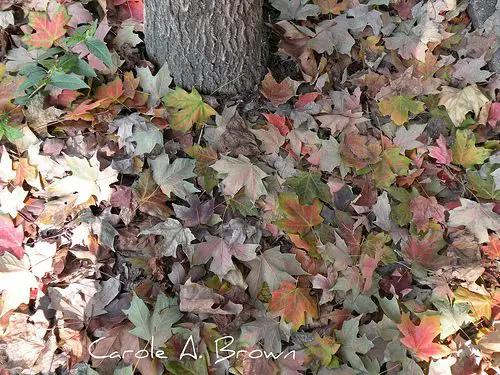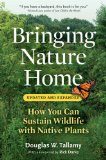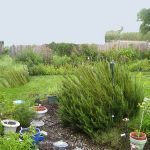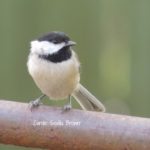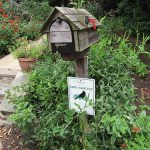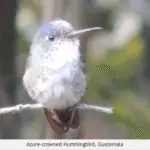This is the time of year when those giant paper bags full of fallen leaves start appearing on sidewalks around the country. This is also the time of year I drive around my neighborhood picking up those bags of leaves in my truck and spreading them throughout my garden beds.
The practice of removing our yard waste to landfills is enormously unsustainable:
- We spend endless hours raking, blowing, and bagging the leaves that fall every year.
- The use of leaf blowers is a source of noise pollution and air pollution, and uses large amounts of non-renewable fossil fuel.
- These huge piles are hauled away by truck, using more gasoline and causing more air pollution.
- Often this organic yard material is dumped into landfills, which destroys wildlife habitat.
- Then we have mulch trucked in to replace the benefits of the leaves we just hauled away.
- And we replace the nutrients that were freely available from the decomposition of those leaves with synthetic fertilizers, which are another petroleum product.
This cycle cannot be sustained without causing increasing damage to our environment. It is much more sustainable to manage this yard waste on our own properties.
Fortunately, this is very easy to do and also returns nutrients to the soil, provides habitat for many organisms, and ensures healthy plants.
I pile up these leaves in every one of my flower beds, sometimes it is more than two feet deep. In the spring I take a hand rake and loosen the leaves around my emerging plants, which hide the leaves during the growing season. By the time the next leaves fall, the old leaves have completely decomposed and the soil is ready for a new blanket.
Why do I do this?
- There is a cycle of life contained in the leaf litter and we destroy many forms of wildlife every time we remove these leaves.
- Many butterflies find shelter in the leaf litter, either in egg, pupal, or adult form, to safely wait out the winter and emerge in the spring.
- Leaf litter provides food and shelter to an amazing variety of invertebrates who break down the leaves, which feeds the soil and other wildlife.
- Healthy plants are dependent on healthy soil.
- The deeper the leaf litter, the more spiders are supported. Spiders are an essential element in keeping pest insects in balance.
- Leaf litter is also home to ladybugs, salamanders, toads, and other predators of pest insects. It is no wonder that pests like aphids thrive when we continue to destroy the habitat of the predators that would keep them under control.
- Every spring these leaves are covered with birds who pick through the leaves in search of a tasty meal.
- Trucked in mulch is not necessary when the leaves are left to cover the soil because the leaf litter acts as a natural blanket of mulch, controlling soil moisture and temperature.
I know there are many gardeners who cannot bear the thought of even one leaf creating a “mess” in their pristine garden beds. But it’s easy to tuck the leaves under your shrubs or in a back corner where they can work their magic and leave your sense of tidyness intact.
Or the leaves can be composted and then spread over your soil so at least the natural nutrients can be returned to the soil.
The benefits to your local wildlife far outweigh any need for neatness.
More From Ecosystem Gardening:
Submit your review | |
I was feeling so overwhelmed at the endless leaf litter that I keep raking under stairs and into garden beds.... with neighbours looking down their noses for not being more ‘tidy’.
I can’t wait to share that it seems my practises might more environmentally friendly 😉
I am one of those tidy gardeners but also environmentally conscious. Normally I would buy bags of wood mulch and apply commercial fertilizers. But then recently I realized that this approach is intended to replicate nature's process, but in an un-natural way. This will be my first season to truly emulate nature by keeping the fallen leaves in the garden toward my goal of a sustainable practice.
I completely agree. We intervine way to much with nature, we get in the way.
Blowing leaf litter from under trees is an even bigger problem than you allude to. Blowers don't just take freshly fallen leaves; they take smaller pieces of leaf compost leaving sterile bare soil. Compaction is the major problem with urban soils, and this compaction contributes to flooding, especially during hurricanes and other disasters. Thanks for raising the issue.

